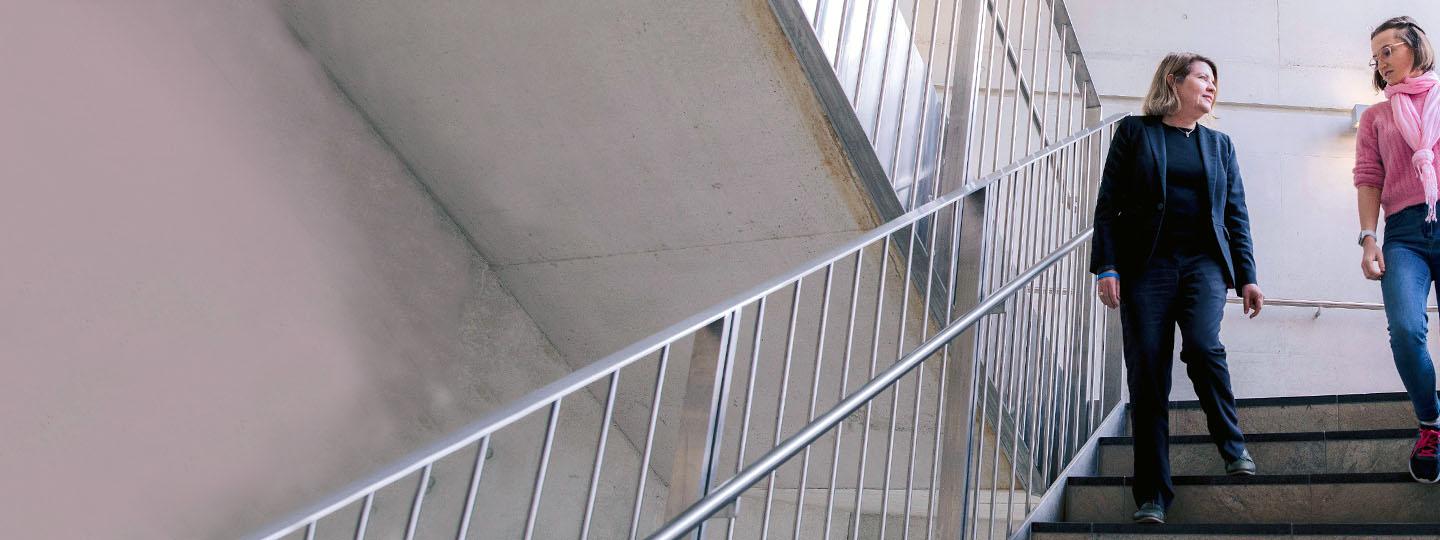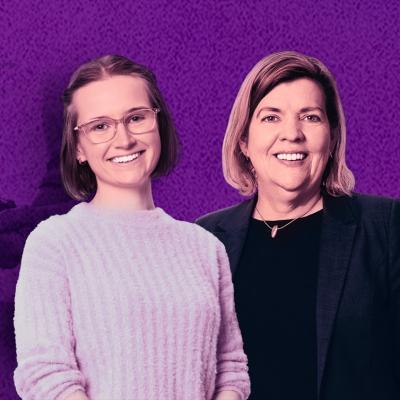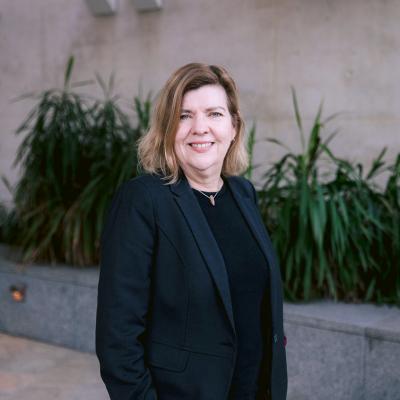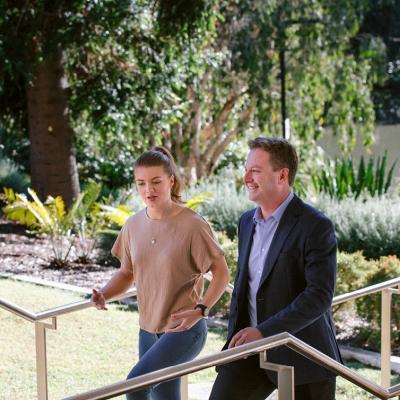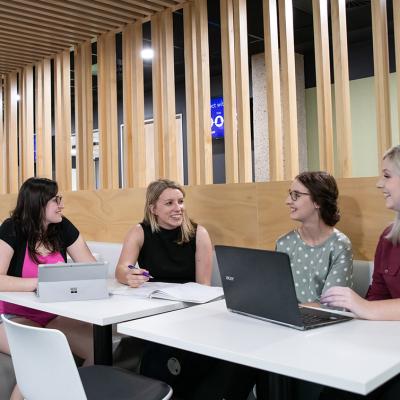Considering studying social work at university? You may have lots of questions. We're here to help you find answers.
- What do you study in social work?
- What does a day in the life of a social work student look like?
- What kind of job can I get with a social work degree?
- Why study social work?
We've interviewed a UQ student and academic to find out. Heidi is a Bachelor of Social Work (Honours) student, and Professor Karen Healy is the Head of Social Work and Counselling at UQ. They’ve teamed up to answer some of your questions and uncover how UQ can give you the skills you need to face the future, even when you don't know exactly what the future will look like.
Let's find out if social work sounds like the study area for you.
What is something that has surprised you about studying at UQ?
Heidi: The fact that I have the opportunity to talk to the very same experts in my field that are writing my textbooks. I'm sitting across from the very same person who's written these resources and there's so much knowledge – I can't see myself getting that anywhere else.
Also, I knew I wanted to work with people and I wanted to help my local community, but I didn't realise the full extent of what social work truly was. People are used to hearing about child protection, or maybe hospital, but I didn’t fully understand the diversity of the field and how far it expands.
What are some of the most interesting jobs your former students are doing now?
Karen: Many of my recent students are working in jobs as counsellors, counselling people in a range of points in the life course. Some work in hospitals as hospital social workers, dealing sometimes with life and death situations. Many work in child protection.
Former students have gotten into really senior roles, such as directors of family support programs, and research directors in the social work and social policy field. They’re also working in community development with Aboriginal and Torres Strait Islander communities, and in places like South-East Asia, working as community development workers as well.
What does a day in the life of a social work student look like?
Heidi: It comes with lectures and it comes with tutorials. Walking into a lecture hall, not only am I presented with an amazing facility – a big screen with the content and all this information, but I get to sit next to other like-minded students who are there for the very same purpose as me, and that is to learn about social work. What makes social work so great at UQ is that kind of personability – being able to talk to other people who are there for the exact same reason as me.
The content is excellent – it's very detailed. Afterwards, I can go to a tutorial and have a conversation about it. I'm not just being told the information, I'm able to sit and actually discuss it and that's what really sets it apart from something like high school, where you're just told. At UQ, you're asked to respond to that conversation and that's a part of my everyday student life.
What opportunities do students have to get hands on experience in the field?
Karen: Our social work degree includes 1000 hours of field placement in Australia or internationally. So at UQ, we very much focus on making sure students have a high-quality experience. And that means that we work with our long-standing relationships with major health providers and major social service providers in the non-government sector.
We also have established international placements in areas such as India and Nepal, where staff have been involved over many years in community development projects. So there's a very big range of places that students go to during the program of study, and that prepares them well for graduating into the real world.
What are the most valuable skills you've learnt as part of your degrees so far?
Heidi: I'd say the most valuable skills I've learned have been my communication skills. When someone is upset there's that human response. You want to console them, maybe even touch them. And that's something that could directly harm that person.
Learning how to talk in a way that is supporting and helpful. It's something you think everyone knows, but in fact it's really a learned skill. False reassurance for example, it really sets up that expectation, which can harm that relationship with the client. So, the most valuable skill has been communication.
Karen: In our teaching across the program we use simulations, which are real-life scenarios involving actors who reflect client situations. And so the student has the opportunity in a safe environment to demonstrate and develop confidence in real-life social work practice, knowledge, and skills.
Heidi: I remember walking in the first time and seeing that actor sitting there and that person wasn't an actor, that was a client, and it really struck me in that moment. I felt like I was at an organisation and I was about to sit down for an interview. And that's when things kind of really start to come together.
How do you prepare students for an unpredictable and changing future?
Karen: It’s around trying to encourage flexibility in thinking and adaptability. So there are some foundational skills and knowledge we seek to teach, and that's about being able to respond to people in different points of the life course from birth through to old age, and even working with families who are bereaved, but also trying to encourage students to be very flexible in your thinking.
So, encouraging you to go beyond the foundations and do your own research. And that's why our program has honours embedded. So that everyone is prepared to be a knowledge maker, as well as a knowledge receiver.
We try to prepare students, mainly about being flexible, adaptable, being confident in their ability to learn. We encourage students to speak about core principles, be confident in those principles and then be able to think for themselves on their feet.
What do you think employees in your field are looking for, and how do you think UQ has equipped you with these skills?
Heidi: To be employable you need a wide range of skills. The first thing that comes to mind is definitely flexibility and confidence. I feel like I've been given the knowledge to be able to answer a question. I can always go back to that foundational information to help guide me.
We have some very strong values of fairness, equitability, and social justice. That really is incorporated into every single decision so knowing that I can answer, and I can practice, and move forward and be flexible in doing so, because I'll always be able to go back to that strong foundation.
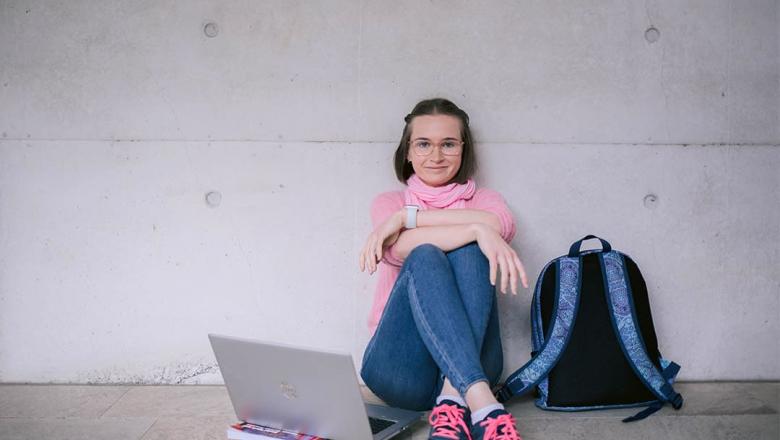
What makes a good student, and are they the same things that employers value?
Karen: I think being very conscientious makes a person a good student. So really wanting to understand the question that's being asked. And then look at ways of solving the problems that have been put before the student. Being creative and flexible in your thinking, being very evidence informed, being willing to go into your own research is something that we appreciate in students and I think employers appreciate that as well.
Being a thoughtful and good communicator – and that's not just with people who use our services, but with our colleagues. Being flexible in your communication approach, adapting to the person who's near you is something else employers look for.
And I think being knowledge makers is important. Employers want people who will push forward knowledge boundaries, not just do things as they are. Doing things better and more effectively to have a bigger impact is what I think employers want, and what we also seek to develop in our students.
What have you learnt about yourself since you began your studies at UQ?
Heidi: I've learned that social work is definitely the career for me. That it’s the perfect outlet to make that difference I wanted to when I was younger.
And I've learned that there are ways I can achieve that. I can help the people around me in a safe way, in a healthy way, and in a way that's actually going to make a really good difference. A way that doesn't take power away from those very people; it puts it in their hands. It feels really good to empower others. Studying social work is giving me that exact tool.
If you could give me one piece of advice that would set me apart as a job candidate, what would it be?
Karen: One piece of advice would be to be committed to your ongoing learning, and to be very open minded about the sorts of roles that you might take on as a social worker.
You could end up becoming a counselling specialist, or you could become a researcher and evaluator, or community developer, or manager or leader of an organisation – show that you're open to those opportunities, and really willing to try out a range of roles in any organisation that you work in. Social work is a very broad field and showing you're open to that will benefit you, and it's something your employer will want as well.
Explore the Bachelor of Social Work (Honours) or discover what it's really like to study other programs at UQ.

